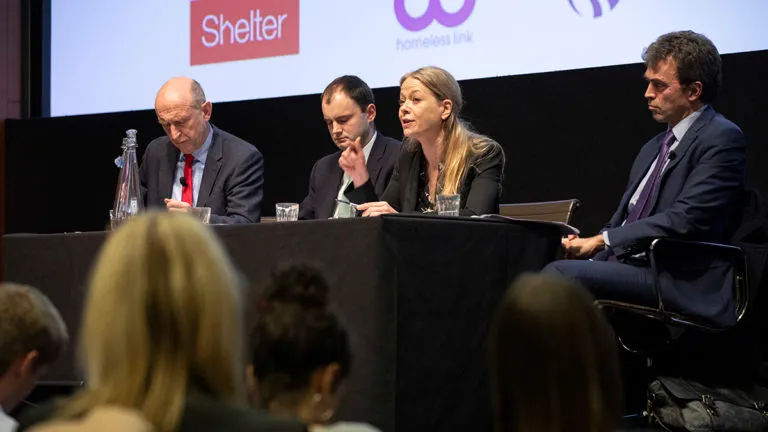What we learnt from the National Housing Hustings 2019
Published: by Shaan Bhangal

On December 12 the United Kingdom is set to go to the polls in a general election for the third time in four years. Right now there are millions of families trapped in insecure private rentals, 1.1 million households on council waiting lists, and, terribly, 135,000 children who will be homeless on Christmas Day. Whoever is in Number 10 after polling day, solving the national housing emergency will need to be a top priority.
Our chief executive, Polly, has written elsewhere what Shelter believes they will need to prioritise. But this week was the chance for the parties to explain their own solution.
On Wednesday December 4, Shelter, along with eight other organisations from the housing and homelessness sectors, hosted the National Housing Hustings 2019 . It was a non-selective hustings attended by representatives from the Green Party, Conservatives, Liberal Democrats and Labour.
The full debate can be watched here – but what were the top takeaways?
On social housing
Social housing was the critical issue of the night, and the thread that tied the questions together throughout – from rural housing to improving building sustainability.
The first question of the night came from Sarah, a single mother from Brent, who is currently living in temporary accommodation with her son – how would the parties give her a secure home?
The Conservatives’ Homelessness Minister, Luke Hall, cited their Affordable Homes Programme, which sets aside £9bn for affordable homes and further outlined that this would include homes specifically for social rent.
Shadow Secretary of State for Housing, Communities and Local Government, John Healey, re-emphasised Labour’s commitment to deliver 150,000 new council and housing association homes by the final year of a Labour government, using £75bn of their Social Transformation Fund. Healey further outlined that 150,000 council and HA homes would remain a yearly target every subsequent year, following their first term in government.
On behalf of the Liberal Democrats, Tom Brake outlined the long-term nature of the housing emergency and the Liberal Democrat commitment to building 100,000 social homes per year, if in government. Brake was further keen to highlight the need to allow local authorities to preserve their social housing stock to restore adequate levels, and outlined that the Lib Dems would devolve the control of the Right-to-Buy policy to councils, to allow his to happen.
Sian Berry highlighted the issue of the current definition of ‘affordable’ that includes homes for up to 80% of local market rents, a level often unaffordable for many renters. To address this issue, Sian stated that the Green Party have committed £100bn for investment in infrastructure with £38bn ringfenced for social homes.
On welfare assistance
Kevin, a former rough sleeper, shared his experience on the streets of London. He highlighted the vital role played by social housing and support services in getting him off the streets and living independently. Kevin asked the panel about their plans for ending rough sleeping and specifically whether they would put the £1 billion back into local authority services that was cut in recent years. Meanwhile Stacy, shared her difficulties finding a home as a young person following the freeze of Local Housing Allowance (LHA) rates in 2016 when her youth meant she was only eligible for the lowest rate.
Sian Berry outlined the Green Party’s commitments to invest £10bn into local authorities in order to refund any service cuts that have taken place in recent years, with part of this provision to be spent on local rough sleeping services. She said the Green Party would introduce a Universal Basic Income that would be a guarantee against poverty, and restore the link between LHA and local market rents.
Tom Brake outlined their five-year commitment to end homelessness, which includes ensuring access to longer-term tenancies and introducing a legal duty within local authorities for ‘somewhere safe to stay’ for those at risk of homelessness. This strategy would be compounded by ensuring that LHA meets the levels of local market rents. Brake emphasised, though, that supply of affordable housing must underpin any strategy to end rough sleeping.
This same sentiment was echoed by John Healey, who stated that ‘we cannot help the homeless, if we haven’t got the homes’. Healey went on to outline Labour’s commitments to ensure that all forms of housing benefit cover the cost of renting and highlighted the importance for housing benefit to be directly linked to housing costs in this regard.
Luke Hall said his party would invest £2 billion in tackling homelessness, of which £100 million would be spent on their rough sleeping strategy that would target inner city areas. He also stated that the Conservatives will unfreeze LHA in April 2020 – a new commitment for his party.
What else?
The candidates all recognised the need for social housing. They also discussed the importance social housing plays in setting the standard for sustainable and safe buildings in our country as well as the need to provide them in rural communities, not just the cities.
For Shelter the hard work starts here. Now we know the parties all recognise the need to do more, we now need their plans to be effective. We will be working to ensure the next government ends the housing emergency in this country. To make sure this happens we will need your help.
Join us in the battle to ensure the next Government delivers the social housing this country needs.